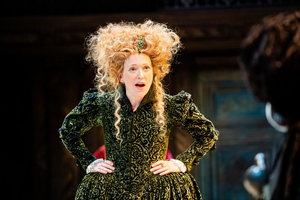Review: THE TAMING OF THE SHREW, Barbican Centre

![]() As you enter the Barbican's auditorium to watch the RSC's The Taming of the Shrew, you can't miss the sound of fireworks in the background. It's implied a celebration is coming. As part of this RSC season alongside As You Like It and Measure for Measure, The Taming of the Shrew is directed by Justin Audibert, but is it an explosion of theatrical goodness or a wet fizzle? Prithee, read on to find out.
As you enter the Barbican's auditorium to watch the RSC's The Taming of the Shrew, you can't miss the sound of fireworks in the background. It's implied a celebration is coming. As part of this RSC season alongside As You Like It and Measure for Measure, The Taming of the Shrew is directed by Justin Audibert, but is it an explosion of theatrical goodness or a wet fizzle? Prithee, read on to find out.
Shakespeare's tale focuses on the two children of Baptista Minola, Katherine and Bianco. The former is the titular shrew, an unpleasant and aggressive boy known about town for his unsavoury actions, whilst the latter, younger son is loved by many of the noblewomen of the town who court his affections. Baptista sets forth that Bianco will only be wed once Katherine has likewise found a partner.
Enter, then, Lucentia and her servant Trania, new to the city of Padua. Ready for the excitement of this vibrant city, Lucentia soon sets eyes on Bianco and, as tends to happen in the Bard's plays, falls in love. She thus conspires to become Bianco's tutor, swapping her role with Trania's to allow her to pretend to be from the lower classes. At the same time, Petruchia, impressed by the challenge of Katherine, marries him and then hatches a plan to kill him with kindness so as to tame him.
If it seems bizarre for a Renaissance play to have so many roles for women, that is because Audibert has gender-flipped the entire show. In doing so, Shakespeare's play ostensibly about cultivating a good housewife instead tackles issues of toxic masculinity and puts forward a community of women who, if not ready to wholly support each other, then at least display ample amounts of cunning and bravado.
Here forms a link between the plays in the RSC's winter season: Rosalind in As You Like It teaches Orlando the true language of wooing, and through the female cast this production highlights the superfluity of the renaissance language of courtship. "To what end are all these words?" one character asks here, and rightly so.
The period costumes designed by Hannah Clark are gorgeous, and Ruth Chan's music is light and enjoyable. Stephen Brimson Lewis's set, a wall of doors, is simple but used efficiently throughout, adding both grandeur and deprivation to characters as needed.
Though the switch generally works well, the cast sadly rely on overly silly characterisations to highlight the hyperbole associated with courtship and affairs of the heart. Whilst this exaggeration might perhaps be the point, the play's length at just under three hours means the comedy drags by the end. Half an hour could easily be shaved off the piece.
Yet, there are numerous joyous performances to be found in this production. Emily Johnstone's lustful Lucentia shows a true triumph of restraint, whilst Laura Elsworthy as Trania brings a delicious sense of naughtiness.
As one of Bianco's suitors, Sophie Stanton as Gremia aroused laughs by her walk alone, which actually visualises Shakespeare's distinction between verse and prose in his writing: she inexplicably flows across the stage when dealing with the other women of the court, and then stomps off when things don't go her way.
Claire Price as Petruchia also warrants praise: through her performance, one feels the character could have been one of Shakespeare's greatest parts for women, had it been written so originally. And that hair - quite untameable! How Amy Trigg manages to get a lightning-fast speech out in such an audible way is beyond me and Joseph Arkley as Katharine marks the character's arc well throughout the show.
Given the number of filibustering men we're being subjected to at present with the General Election looming, visiting this "taming school" at the Barbican serves as an ample point of relief. Though over-long, it is well worth packing your bags and making a trip to Padua for the evening to see this show, which reminds us of the verbosity (*cough*) we can all be prone to use when inclined.
Photograph: Ikin Yum.
Reader Reviews
Videos

